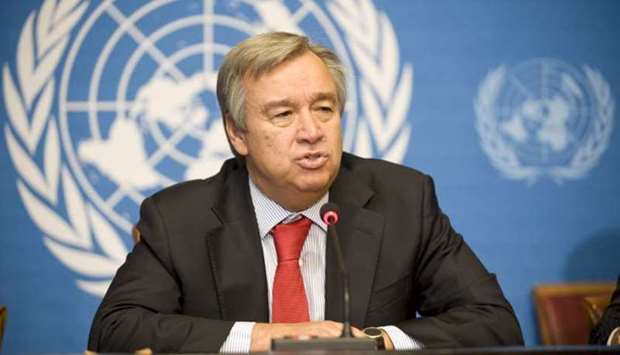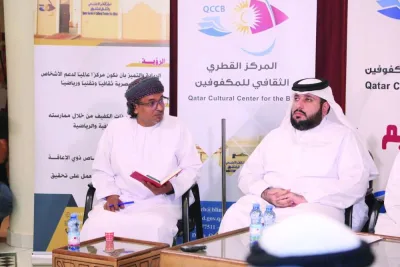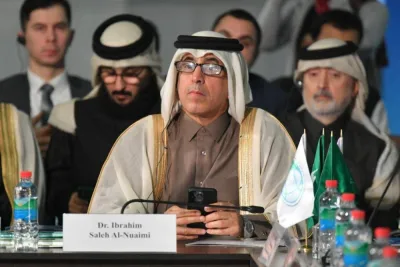The speech delivered by His Highness the Emir Sheikh Tamim bin Hamad al-Thani, calling for a dialogue based on mutual respect to solve the Gulf crisis, has been acclaimed by world leaders including UN Secretary General Antonio Guterres.
Welcoming "the invitation of His Highness the Emir for dialogue to resolve the GCC crisis", the UN Secretary General encouraged all parties to start talks to lift the siege imposed on Qatar and "seek an acceptable solution for all parties".
He also praised Kuwait's mediation efforts to lift the siege imposed on Qatar, expressing hope that these efforts will continue, the official Qatar News Agency (QNA) said.
France also welcomed Qatar's call for dialogue to resolve the dispute considering the Emir's speech as a "promising development". A statement from the French Foreign Ministry underlined the recent efforts to resolve the dispute involving several nations in the GCC and also involving Egypt, the Kuwaiti News Agency (KUNA) said.
Paris said it "encourages all efforts to facilitate a rapid settlement of the differences in the GCC and with Egypt," it added.
France said it supports the ongoing mediation efforts in the Gulf crisis by the Kuwaiti Emir Sheikh Sabah al-Ahmad al-Jaber al-Sabah and it encouraged the disputing parties to open a dialogue in light of the latest "promising developments".
French Foreign Minister Jean-Yves Le Drian travelled to the region, including Kuwait, on July 15-16 to add his voice to mediation efforts.
British Foreign Secretary Boris Johnson has welcomed the Emir's address in which he outlined Qatar’s opposition to terrorism, commitment to resolving differences through dialogue, and support for Kuwaiti mediation.
Johnson said in a statement: "I welcome the Emir of Qatar’s commitment to combat terrorism in all its manifestations, including terrorist financing. The Emir also pledged to resolve the remaining differences with Saudi Arabia, the UAE, Egypt and Bahrain through dialogue, negotiation, and Kuwaiti mediation. These steps will help to resolve the dispute."
He hoped that in turn Saudi Arabia, the UAE, Egypt and Bahrain would respond by taking steps towards lifting the embargo. "This will allow substantive discussions on remaining differences to begin," he added.
In his address to the nation on July 21, His Highness the Emir said that Qatar was ready for dialogue to resolve the diplomatic crisis, but stressed that any solution to the crisis must respect Qatar's sovereignty.
"We are open to dialogue to resolve the outstanding problems [so long as Qatar's] sovereignty is respected," the Emir said in the televised address, his first since Saudi Arabia, Bahrain, the UAe and Egypt cut ties with the country.
Ajay Sharma, British Ambassador to Qatar, said in a tweet yesterday: "UK welcomes commitment in the Emir's speech to combat terrorism and resolve GCC crisis through dialogue. The UK hopes steps will be taken to lift embargo."
Italian Foreign Minister Angelino Alfano has called for the opening of the land border between Qatar and Saudi Arabia as a goodwill gesture to launch talks and to allay the humanitarian implications of the Gulf crisis.
" I hope that a sincere dialogue between the countries involved will be initiated, based on respect for international law, on the sovereignty and dignity of each country, in order to ease tensions, address the origins of disagreements and lead as soon as possible, to a long-lasting and sustainable solution."
Russian Foreign Minister Sergei Lavrov said Moscow supports Kuwait's mediation efforts. "If as part of those efforts or in addition to them all sides think that Russia could also do something useful, we will be ready to respond to such appeals," he said.
"We are interested in this crisis being overcome, taking into account mutual concerns and finding solutions which will be acceptable for all participants of this process," Lavrov told Kurdish television channel Rudaw, according to a transcript of the interview published on the foreign ministry's website.
Welcoming "the invitation of His Highness the Emir for dialogue to resolve the GCC crisis", the UN Secretary General encouraged all parties to start talks to lift the siege imposed on Qatar and "seek an acceptable solution for all parties".
He also praised Kuwait's mediation efforts to lift the siege imposed on Qatar, expressing hope that these efforts will continue, the official Qatar News Agency (QNA) said.
France also welcomed Qatar's call for dialogue to resolve the dispute considering the Emir's speech as a "promising development". A statement from the French Foreign Ministry underlined the recent efforts to resolve the dispute involving several nations in the GCC and also involving Egypt, the Kuwaiti News Agency (KUNA) said.
Paris said it "encourages all efforts to facilitate a rapid settlement of the differences in the GCC and with Egypt," it added.
France said it supports the ongoing mediation efforts in the Gulf crisis by the Kuwaiti Emir Sheikh Sabah al-Ahmad al-Jaber al-Sabah and it encouraged the disputing parties to open a dialogue in light of the latest "promising developments".
French Foreign Minister Jean-Yves Le Drian travelled to the region, including Kuwait, on July 15-16 to add his voice to mediation efforts.
British Foreign Secretary Boris Johnson has welcomed the Emir's address in which he outlined Qatar’s opposition to terrorism, commitment to resolving differences through dialogue, and support for Kuwaiti mediation.
Johnson said in a statement: "I welcome the Emir of Qatar’s commitment to combat terrorism in all its manifestations, including terrorist financing. The Emir also pledged to resolve the remaining differences with Saudi Arabia, the UAE, Egypt and Bahrain through dialogue, negotiation, and Kuwaiti mediation. These steps will help to resolve the dispute."
He hoped that in turn Saudi Arabia, the UAE, Egypt and Bahrain would respond by taking steps towards lifting the embargo. "This will allow substantive discussions on remaining differences to begin," he added.
In his address to the nation on July 21, His Highness the Emir said that Qatar was ready for dialogue to resolve the diplomatic crisis, but stressed that any solution to the crisis must respect Qatar's sovereignty.
"We are open to dialogue to resolve the outstanding problems [so long as Qatar's] sovereignty is respected," the Emir said in the televised address, his first since Saudi Arabia, Bahrain, the UAe and Egypt cut ties with the country.
Ajay Sharma, British Ambassador to Qatar, said in a tweet yesterday: "UK welcomes commitment in the Emir's speech to combat terrorism and resolve GCC crisis through dialogue. The UK hopes steps will be taken to lift embargo."
Italian Foreign Minister Angelino Alfano has called for the opening of the land border between Qatar and Saudi Arabia as a goodwill gesture to launch talks and to allay the humanitarian implications of the Gulf crisis.
" I hope that a sincere dialogue between the countries involved will be initiated, based on respect for international law, on the sovereignty and dignity of each country, in order to ease tensions, address the origins of disagreements and lead as soon as possible, to a long-lasting and sustainable solution."
Russian Foreign Minister Sergei Lavrov said Moscow supports Kuwait's mediation efforts. "If as part of those efforts or in addition to them all sides think that Russia could also do something useful, we will be ready to respond to such appeals," he said.
"We are interested in this crisis being overcome, taking into account mutual concerns and finding solutions which will be acceptable for all participants of this process," Lavrov told Kurdish television channel Rudaw, according to a transcript of the interview published on the foreign ministry's website.



